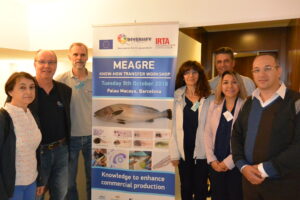 A full-day seminar was held on October 9, 2018, at Palau Macaya, Barcelona, Spain, in order to disseminate the results obtained after 5-years of research on meagre (Argyrosomus regius) by the project DIVERSIFY
A full-day seminar was held on October 9, 2018, at Palau Macaya, Barcelona, Spain, in order to disseminate the results obtained after 5-years of research on meagre (Argyrosomus regius) by the project DIVERSIFY 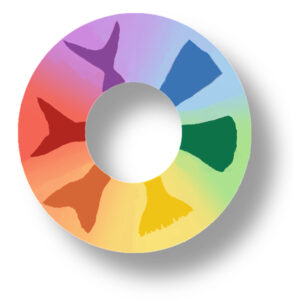 (www.diversifyfish.eu). The seminar included brief presentations on selected aspects given by DIVERSIFY Partners, including reproduction and artificial fertilization, nutrition of larvae and juveniles, feeding behavior, cage culture husbandry, final product diversification and quality, socioeconomic issues and marketing, etc. Two presentations were also given by researchers from outside the consortium, working on meagre reproduction and larval rearing (IPMA, Portugal) and feed production (Sparos, Portugal).
(www.diversifyfish.eu). The seminar included brief presentations on selected aspects given by DIVERSIFY Partners, including reproduction and artificial fertilization, nutrition of larvae and juveniles, feeding behavior, cage culture husbandry, final product diversification and quality, socioeconomic issues and marketing, etc. Two presentations were also given by researchers from outside the consortium, working on meagre reproduction and larval rearing (IPMA, Portugal) and feed production (Sparos, Portugal).
The workshop was attended by 38 persons, from various European countries representing commercial aquaculture companies, feed producers, veterinarians, but also researchers and University professors. The Project Coordinator (Dr. C.C. Mylonas, HCMR) and the Species Leader for meagre (Dr. A. Estevez, IRTA) gave introductory presentations to familiarize the attendants with the project, its structure and objectives.
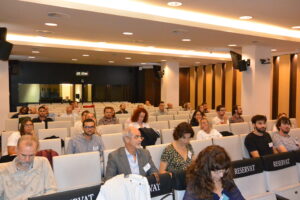 The presentations begun with the work on reproduction and genetics, with Dr Neil Duncan (IRTA) presenting the studies on the development of paired-spawning and in vitro fertilization methods for meagre, in order to enable the industry to implement breeding selection programs. The following presentation from Dr Maria Jesus Zamorano (FCPCT) presented the genetic evaluation of the available broodstocks in Europe, demonstrating that although the variation is reduced, the broodstocks can be used as basis populations for the breeding selection programs. Then followed presentations on larval rearing and nutrition, as well as feeding behavior and grow out husbandry. In the afternoon session, the presentations from DIVERSIFY focused on fish health, socioeconomics and new product development.
The presentations begun with the work on reproduction and genetics, with Dr Neil Duncan (IRTA) presenting the studies on the development of paired-spawning and in vitro fertilization methods for meagre, in order to enable the industry to implement breeding selection programs. The following presentation from Dr Maria Jesus Zamorano (FCPCT) presented the genetic evaluation of the available broodstocks in Europe, demonstrating that although the variation is reduced, the broodstocks can be used as basis populations for the breeding selection programs. Then followed presentations on larval rearing and nutrition, as well as feeding behavior and grow out husbandry. In the afternoon session, the presentations from DIVERSIFY focused on fish health, socioeconomics and new product development.
In general, it was commented that meagre culture is not new since the production of the species started some years ago in some European countries (2005 in Spain, Greece and France), although it did not progress as expected and finally collapsed (no market demand among other reasons). In this new chance for the species, companies are much more confident, mainly because there is quite some knowledge on crucial topics generated in the project (reproduction control, larval survival and nutritional aspect) and quite some technological advances available too. So the general opinion is that it is a great aquaculture species.
Attendees were very interested in having more detailed nutritional information on the species since there is no commercial specifically formulated diet for meagre. There was also a request on availability of specific recommendations and protocols for the culture of the species and it was indicated that a Technical Manual of the species has been elaborated and it is available at the project web https://www.diversifyfish.eu/meagre-workshop.html as a downloadable document
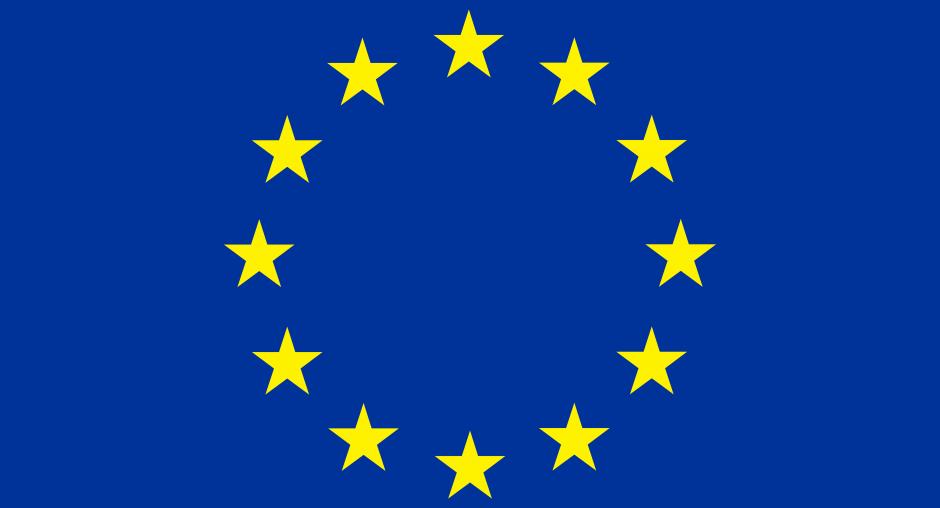 |
Co-funded by the Seventh Framework Programme of the European Union |
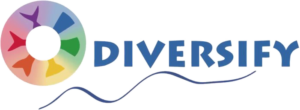 |




